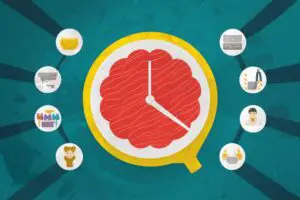What is Digital Overload and the Link Between Screen Time and Memory Loss?
In today’s digital age, the pervasive presence of screens in our daily lives has raised concerns about the potential impact of excessive screen time on cognitive functions, particularly memory.
The phenomenon of digital overload, characterized by constant exposure to electronic devices, poses a significant challenge to our ability to retain and recall information.
This article explains in-depth relationship between screen time and memory loss, exploring the underlying mechanisms, cognitive effects, and potential strategies to mitigate the adverse consequences of digital saturation on our mental faculties.

Table of Contents
ToggleIntroduction to Digital Overload
In today’s digital age, we are constantly bombarded with an overwhelming amount of information and stimuli from various digital devices and platforms.
This phenomenon, known as digital overload, refers to the state of being consumed and inundated by a surplus of digital content and distractions.
With the rise of smartphones, social media, and constant connectivity, individuals are finding it increasingly difficult to manage and filter through the vast amount of information that is constantly being pushed towards them.
This constant exposure to digital content can lead to feelings of stress, anxiety, and burnout, as our brains struggle to process and make sense of the sheer volume of information being presented to us.
Digital overload can have detrimental effects on our cognitive abilities, emotional well-being, and overall quality of life. As our attention spans become increasingly fragmented and our ability to focus and concentrate is compromised, we may find it difficult to engage in deep thinking, problem-solving, and critical analysis.
Furthermore, the constant barrage of notifications, alerts, and messages can lead to feelings of overwhelm and distractibility, making it challenging to stay present and focused on important tasks and responsibilities.
In order to combat digital overload, it is crucial to develop healthy digital habits, establish boundaries with technology, and prioritize self-care and mindfulness in our daily lives.
By consciously taking steps to limit our exposure to digital stimuli and prioritize our mental well-being, we can mitigate the negative effects of digital overload and maintain a healthy balance between our digital lives and our physical and emotional well-being.
Defining Digital Overload
In the digital age, people are bombarded with an excessive amount of information and stimuli, leading to what is known as digital overload.
With the constant presence of smartphones, social media, email, and other digital technologies, people are bombarded with notifications, messages, and content that can lead to feelings of stress, anxiety, and distraction.

This can result in difficulty focusing, decreased productivity, and even physical symptoms such as headaches and eyestrain.
It is essential for individuals to be mindful of their digital consumption and to set boundaries in order to prevent digital overload and maintain a healthy balance between their online and offline lives.
By being intentional with their use of technology and engaging in practices such as digital detoxes and mindfulness, individuals can take steps to manage their digital consumption to combat the negative effects of this overload and improve their well-being in today’s increasingly digital world.
Read more about “Breaking Down the ‘Digital Dementia’ Epidemic: What Science Tells Us!”
Screen Time Trends in Modern Society
The prevalence of screens in modern society has skyrocketed in the last few decades, with the advent of smartphones, tablets, and other electronic devices.
This has led to a significant increase in screen time among individuals of all ages. According to recent studies, the average American adult spends nearly 11 hours per day consuming media, and children and adolescents are not far behind.
This trend has raised concerns about the potential negative effects of excessive screen time on physical and mental health, as well as social development.
One of the main issues with increased screen time is its impact on sleep quality. The blue light emitted from screens can disrupt the body’s natural sleep-wake cycle, leading to difficulties falling asleep and staying asleep.
In addition, excessive screen time has been linked to an increased risk of obesity, as individuals are more likely to engage in sedentary activities like watching TV or playing video games rather than being physically active.
Furthermore, prolonged screen time has been associated with poor academic performance, as it can distract students from their studies and hinder their ability to concentrate.
To address these concerns, it is important for individuals to be mindful of their screen time and establish healthy habits that prioritize real-life interactions and activities over digital consumption.
Read more about “How Screen Time Impacts Our Mental Health? Separating Fact from Fiction”
The increasing presence of digital technology
The rise of digital technology has had a profound impact on daily life, transforming the way we communicate, work, and engage with the world around us.
With the widespread adoption of smartphones, tablets, and other digital devices, individuals now have instant access to vast amounts of information at their fingertips.
Social media platforms have also revolutionized the way we interact with one another, allowing us to connect with people across the globe in real-time.
Additionally, digital technology has streamlined many aspects of our daily routines, from online shopping and banking to remote work and virtual meetings.
As digital technology continues to advance, its presence in daily life only seems to grow stronger. The integration of smart devices and Internet of Things (IoT) technology into our homes, workplaces, and even wearable gadgets has made our lives more connected and convenient than ever before.
However, this increased connectivity also raises concerns about privacy and security, as our personal data becomes more vulnerable to cyber threats.
It is essential for individuals to stay informed and educated about the risks and benefits of digital technology in order to navigate this rapidly evolving landscape responsibly.
Overall, the rise of digital technology in daily life presents both exciting opportunities and critical challenges that will shape the future of society in profound ways.
Read more about “The Impact of Excessive Screen Use on Cognitive Abilities: A Closer Look”
How Excessive Screen Time Impacts Cognitive Function?
Excessive screen time has become a pervasive issue in today’s society, with individuals spending countless hours each day in front of various electronic devices.
This overreliance on screens, whether it be smartphones, tablets, computers, or televisions, has been shown to have a significant impact on cognitive function.
Research has indicated that prolonged exposure to screens can lead to a decline in attention span, memory, and problem-solving skills. This is because excessive screen time can overstimulate the brain, leading to cognitive fatigue and decreased cognitive performance.
Additionally, the blue light emitted from screens has been linked to disruptions in sleep patterns, which can further impair cognitive function by affecting concentration and overall alertness.
Furthermore, spending excessive amounts of time on screens can also have long-term effects on brain development. Studies have shown that children and adolescents who spend more time engaged with screens tend to have weaker cognitive abilities, particularly in areas such as critical thinking and decision-making.
This is concerning, as cognitive function plays a crucial role in academic achievement, social interactions, and overall success in life. Therefore, it is important for individuals to be mindful of their screen time habits and take steps to limit their exposure in order to preserve and enhance cognitive function.
Impact of Excessive Screen Time on Memory
Excessive screen time has become a pervasive issue in today’s society, with individuals spending countless hours on their electronic devices each day.
This phenomenon has raised concerns about its potential impact on cognitive functions, particularly memory. Research has shown that prolonged exposure to screens, such as smartphones, tablets, and computers, can have detrimental effects on memory consolidation and retrieval.

The constant engagement with screens disrupts the brain’s ability to process information effectively, leading to difficulties in encoding memories and recalling them later on.
Moreover, the blue light emitted from screens has been linked to disruptions in the production of melatonin, a hormone that plays a crucial role in regulating sleep-wake cycles.
Poor sleep quality resulting from excessive screen time can further impair memory functions, as the brain is unable to adequately consolidate and store new information.
This cyclical pattern of screen use, disrupted sleep and impaired memory can have long-lasting consequences on an individual’s cognitive abilities and overall well-being.
It is crucial for individuals to be mindful of their screen habits and prioritize activities that promote healthy cognitive functioning, such as engaging in physical exercise, practicing mindfulness, and getting an adequate amount of sleep.
By reducing excessive screen time and adopting a balanced approach to technology use, individuals can mitigate the negative impact on their memory and enhance their cognitive abilities.
Research studies linking excessive screen time to memory loss
Recent studies have shown a concerning link between excessive screen time and memory loss. Prolonged exposure to screens, such as smartphones, tablets, computers, and televisions, has been found to negatively impact cognitive functions, including memory retention and recall.
The constant stimulation and information overload from screens can overwhelm the brain and lead to difficulties in forming new memories or retrieving old ones.
Additionally, the blue light emitted from screens has been shown to disrupt the production of melatonin, a hormone that plays a key role in memory consolidation during sleep.
Furthermore, spending hours in front of screens can also contribute to a sedentary lifestyle, which is known to have negative effects on overall brain health and memory.
Physical activity has been proven to be crucial for maintaining good cognitive function, as it improves blood flow to the brain and boosts the production of neurotransmitters that are essential for memory formation.
Therefore, reducing screen time and engaging in regular exercise can be beneficial for preserving memory and overall brain health.
It is important for individuals to be mindful of their screen usage and incorporate activities that promote cognitive health in order to prevent memory loss in the long term.
Cognitive Effects of Digital Overload
Digital overload refers to the excessive exposure to digital devices and platforms, leading to mental fatigue and cognitive decline. This phenomenon has become increasingly prevalent in today’s society, as individuals are bombarded with a constant flow of information and stimuli from various online sources.
Research has shown that prolonged use of digital devices can have detrimental effects on cognitive functions such as attention, memory, and decision-making.
The constant multitasking and distractions that come with digital overload can impair one’s ability to focus and process information effectively. This can ultimately lead to decreased productivity and overall cognitive performance.

Furthermore, digital overload can also have long-term effects on the brain’s neural pathways and structures. Excessive screen time has been linked to changes in brain chemistry, particularly with the release of dopamine, a neurotransmitter associated with pleasure and reward.
This can lead to dependency on digital devices, as individuals seek out the constant stimulation and gratification they provide.
Over time, this can contribute to cognitive issues such as decreased ability to regulate emotions and impulses, as well as potential risk for developing conditions such as attention deficit hyperactivity disorder (ADHD).
In order to combat the cognitive effects of digital overload, it is important for individuals to establish healthy digital habits, such as setting boundaries on screen time, taking regular breaks, and engaging in activities that promote mental wellness and cognitive function.
The Role of Screen Time in Memory Formation
In the age of advanced technology, screen time plays a significant role in memory formation. Research has shown that prolonged exposure to screens such as computers, smartphones, and tablets can have both positive and negative effects on memory.
On one hand, interactive screen time, such as educational games and simulations, can enhance cognitive skills and improve memory formation.
This is especially beneficial for students who can engage in interactive learning processes that stimulate memory retention. On the other hand, excessive screen time, particularly when used for passive activities such as binge-watching TV shows or mindless scrolling on social media, can have detrimental effects on memory.

This is because the brain’s ability to form and retain memories can be compromised due to the limited cognitive engagement required by these activities.
Furthermore, the impact of screen time on memory formation may also vary depending on individual factors such as age, cognitive abilities, and the type of content being consumed.
For instance, studies have shown that children who are exposed to screens at a young age may develop slower cognitive skills and have poorer memory retention compared to those who limit their screen time.
Additionally, the multitasking nature of screen time, where individuals engage in various activities simultaneously, can lead to a decrease in attention span and memory consolidation.
Therefore, it is crucial to strike a balance between screen time usage and engagement in activities that promote memory formation, such as reading, physical exercise, and social interactions.
The Role of Multitasking in Memory Decline
Multitasking has become increasingly prevalent in today’s society, as individuals are constantly juggling multiple tasks at once in order to keep up with the demands of daily life. However, research has shown that engaging in too much multitasking can actually have detrimental effects on memory function.
When individuals attempt to focus on multiple tasks simultaneously, their cognitive resources are divided, leading to decreased efficiency in information processing and encoding. This can result in difficulties with retaining and recalling information, ultimately contributing to memory decline over time.

Furthermore, multitasking has been found to lead to increased levels of stress and anxiety, which can further impair memory function.
When individuals are constantly switching between tasks and trying to keep up with various demands, their stress levels can skyrocket, impacting their ability to concentrate and retain information.
Additionally, the constant bombardment of stimuli and distractions that come with multitasking can overload the brain’s capacity to process and store memories effectively.
As a result, individuals may struggle to recall important information or experiences, leading to potential memory decline in the long term.
To mitigate the negative effects of multitasking on memory, it is important for individuals to prioritize focus and concentration on one task at a time, allowing for optimal encoding and retention of information.
How Screen Time Influences Memory Retention?
Recent studies have shown that excessive screen time can have a negative impact on memory retention. One reason for this is the constant distractions and interruptions that come with using electronic devices.
When individuals are constantly switching between tasks or checking notifications on their devices, it can disrupt their ability to focus and consolidate information into long-term memory.
Additionally, the blue light emitted from screens can interfere with the production of melatonin, a hormone that plays a crucial role in memory formation and consolidation during sleep. This disruption can lead to poorer memory retention and cognitive performance over time.
Furthermore, the use of screens for extended periods of time has been linked to decreased cognitive functions such as attention and memory.

The constant exposure to various forms of media and information can overload the brain and make it more difficult to retain important details.
Additionally, the convenience of having information readily accessible on screens can lead to individuals relying on external sources for information rather than engaging in active learning and critical thinking, which are essential for memory retention.
In short, it is important for individuals to be mindful of their screen time usage and to incorporate breaks and other cognitive activities to enhance memory retention and overall cognitive function.
Strategies to reduce screen time for better memory function
In today’s digital age, excessive screen time has become a common issue that has raised concerns about its impact on memory function.
Research has shown that increased exposure to screens, such as smartphones, tablets, and computers, can lead to cognitive overload and decreased memory retention. To combat these negative effects, it is crucial to implement strategies to reduce screen time.
One effective strategy is to set specific time limits for screen use each day and prioritize engaging in activities that stimulate the brain, such as reading, exercising, or socializing in-person.
Additionally, creating a designated “screen-free” zone in the home, such as the bedroom or dining area, can help limit the temptation to constantly check devices and promote healthier habits.
Another strategy to reduce screen time for better memory function is to incorporate mindfulness practices into daily routines. Mindfulness techniques, such as meditation and deep breathing exercises, have been shown to improve focus, concentration, and memory retention.
By setting aside time each day to practice mindfulness, individuals can train their brain to be more present and aware of their surroundings, which can ultimately lead to improved memory function.
Additionally, incorporating regular breaks from screens throughout the day can help reduce eye strain and mental fatigue, allowing the brain to rest and recharge for optimal cognitive performance.
By implementing these strategies, individuals can take proactive steps to reduce screen time and enhance memory function for better overall health and well-being.
How to balance digital usage for overall cognitive health?
In today’s digital age, it is becoming increasingly important to balance our usage of digital devices for overall cognitive health.
Excessive screen time has been linked to a variety of negative effects on cognitive function, such as decreased attention span, impaired memory, and reduced problem-solving skills.
It is crucial for individuals to be mindful of their digital usage in order to maintain optimal cognitive health. By setting limits on screen time, engaging in activities that stimulate the brain, and taking breaks from electronic devices, individuals can help to mitigate the negative impact of excessive digital usage on their cognitive abilities.

Moreover, the constant stimulation provided by digital devices can have a detrimental impact on mental health, leading to increased stress, anxiety, and even depression.
It is important for individuals to be aware of the potential negative effects of excessive digital usage on their mental well-being and take steps to find a balance that works for them.
By incorporating mindfulness practices, engaging in offline activities, and fostering real-life connections, individuals can help to maintain their cognitive health and overall well-being in the digital world.
Ultimately, finding a balance between using digital devices for convenience and entertainment, and engaging in activities that promote cognitive health and mental well-being is key to leading a healthy and fulfilling life in the digital age.
Ways to Combat Memory Loss Due to Screen Time
With the rise of technology and increased screen time, many individuals are experiencing memory loss and cognitive decline. It is essential to consider strategies to combat this issue and preserve cognitive function.
One way to combat memory loss due to screen time is to incorporate regular mental exercises and cognitive activities into one’s daily routine.
Engaging in activities such as puzzles, reading, or memory games can help strengthen cognitive abilities and prevent memory loss associated with excessive screen time.
Additionally, maintaining a healthy lifestyle through regular exercise, a balanced diet, and sufficient sleep can also contribute to overall brain health and function, reducing the risk of memory loss.
Another effective way to combat memory loss due to screen time is to practice mindfulness and limit screen time. Mindfulness techniques, such as meditation and deep breathing exercises, can help reduce stress levels and improve focus and concentration.
Setting boundaries for screen time, such as taking regular breaks, limiting screen use before bedtime, and avoiding excessive screen use can also help reduce the impact of screen time on memory and cognitive function.
By incorporating these strategies into one’s daily routine, individuals can combat memory loss caused by excessive screen time and maintain optimal cognitive health.
Tips for improving memory and focus in a digital world
In today’s digital age, the constant influx of information and distractions can make it difficult to maintain focus and retain important details in our memory.
However, there are several strategies that can help improve memory and focus in a digital world. Firstly, practicing mindfulness and meditation can help increase focus and reduce mental clutter.
By taking the time to quiet the mind and be fully present in the moment, individuals can improve their ability to retain information and make better connections between concepts.
Additionally, regular exercise and a healthy diet have been shown to have a positive impact on cognitive function, enhancing memory and concentration levels.
Another effective way to improve memory and focus in a digital world is to establish a routine and create a conducive work environment.
Implementing a structured schedule can help build a sense of predictability and control, leading to improved concentration and memory retention.
Moreover, minimizing distractions by organizing workspaces and utilizing tools such as noise-cancelling headphones or productivity apps can significantly boost focus and information processing.
By adopting these strategies and making conscious efforts to prioritize mental wellness, individuals can navigate the digital world with greater clarity and cognitive efficiency.
Case studies illustrating the connection between screen time and memory
Recent case studies have shed light on the potential connection between excessive screen time and memory function. One study conducted by the University of California, San Francisco found that individuals who spent more than four hours a day on screens scored lower on memory tests compared to those who spent less time using screens.
The study also revealed that prolonged screen time may lead to reduced hippocampal volume, a part of the brain responsible for memory and learning. These findings suggest that excessive screen time may have a negative impact on memory performance.
Another study conducted by Johns Hopkins University examined the effects of screen time on memory retention in children. The study found that children who spent more time on screens had more difficulty recalling information compared to those who had limited screen exposure.
Additionally, the study found that screen time was associated with decreased grey matter volume in regions of the brain linked to memory.
These findings highlight the importance of limiting screen time, especially in children, to protect memory function and cognitive development.
In short, the evidence from these case studies suggests a significant relationship between screen time and memory, emphasizing the need for further research and awareness of the potential consequences of excessive screen use on memory function.
Research Findings and Studies on Screen Time and Memory Loss
Research findings and studies on screen time and memory loss have garnered significant attention in recent years. As technology continues to advance and screens become more prevalent in our daily lives, concerns have been raised about the potential negative impact on cognitive function, specifically memory.
One study conducted by researchers at the University of California, San Francisco found that increased screen time among older adults was associated with a decline in episodic memory, which is the capacity to recall particular events or experiences.
The study suggested that the constant exposure to screens may overwhelm the brain and hinder its ability to form and retrieve memories effectively.
Another study published in the Journal of the American Medical Association Pediatrics examined the effects of screen time on children’s memory.
The researchers found that children who spent more time in front of screens had lower scores on memory tests compared to those who had limited screen time.
The study highlighted the importance of moderation and balance when it comes to screen use, especially for developing brains.
These research findings underscore the need for further investigation into the impact of screen time on memory and emphasize the importance of being mindful of how much time we spend in front of screens to maintain optimal cognitive function.
The need for mindful technology use in modern society
As modern society becomes increasingly reliant on technology, it is imperative to emphasize the importance of mindful technology use.
Mindful technology use entails being conscious and deliberate about how we interact with technology, making intentional choices that prioritize our well-being and productivity.
With the prevalence of smartphones, social media, and other digital devices, it is all too easy to fall into mindless scrolling and distractions that can negatively impact our mental health and ability to focus.
By practicing mindfulness in our technology use, we can cultivate a healthier relationship with our devices and ultimately enhance our overall well-being.
Furthermore, in today’s fast-paced world, it is crucial to be proactive in managing our technology usage in order to mitigate the potential negative effects of excessive screen time.
Research has shown that excessive use of technology can lead to increased stress, anxiety, and decreased attention span. By adopting mindful practices such as setting limits on screen time, incorporating tech-free breaks into our daily routines, and being present in the moment rather than constantly seeking validation from social media, we can regain control over our technology habits and improve our mental and emotional health.
Ultimately, the need for mindful technology use in modern society is crucial for maintaining a healthy balance between our digital lives and our overall well-being.
Conclusion:
From cognitive decline to memory challenges, the consequences of digital overload are becoming more apparent. It’s time to hit pause and consider how our screen habits may be shaping our memory in the long run.
As we navigate the digital landscape and grapple with the consequences of prolonged screen time on memory, it becomes increasingly vital to strike a balance between technology usage and cognitive well-being.
By acknowledging the potential risks of digital overload and implementing mindful strategies to reduce screen exposure, we can safeguard our memory functions and nurture a healthier relationship with technology.
FREQUENTLY ASKED QUESTIONS
1. Can excessive screen time really cause memory loss?
While the research is still evolving, there is growing evidence to suggest that excessive screen time can negatively impact cognitive function, including memory. Studies have shown that prolonged exposure to screens and digital distractions can contribute to memory impairment and reduced cognitive performance. It is important to be mindful of the amount of time spent on screens and take steps to mitigate the potential negative effects.
2. Are all types of screen time equally harmful to memory?
The impact of screen time on memory can vary depending on the nature of the activity and its cognitive demands. Engaging in activities that require active cognitive engagement, such as learning a new skill or problem-solving, may have a different effect on memory compared to passive activities like scrolling through social media. It is important to strike a balance and prioritize activities that promote cognitive stimulation and memory retention.
3. Are there any benefits of technology for memory enhancement?
While excessive screen time can have negative effects, technology can also offer tools and resources to enhance memory and cognitive health. There are digital apps and tools specifically designed to improve memory and cognitive function through brain training exercises, memory games, and organization aids. These technologies can be utilized in a balanced and mindful manner to support memory enhancement efforts.
4. How can I reduce screen time without sacrificing productivity or connectivity?
Reducing screen time doesn’t necessarily mean completely disconnecting from the digital world. It involves adopting a more mindful approach to technology use. Setting realistic screen time limits, practicing digital detoxes, and establishing designated screen-free periods or zones can help reduce screen time while still allowing for productivity and connectivity. Additionally, finding alternative activities that promote cognitive engagement, such as reading, physical exercise, or socializing, can help strike a healthier balance.


